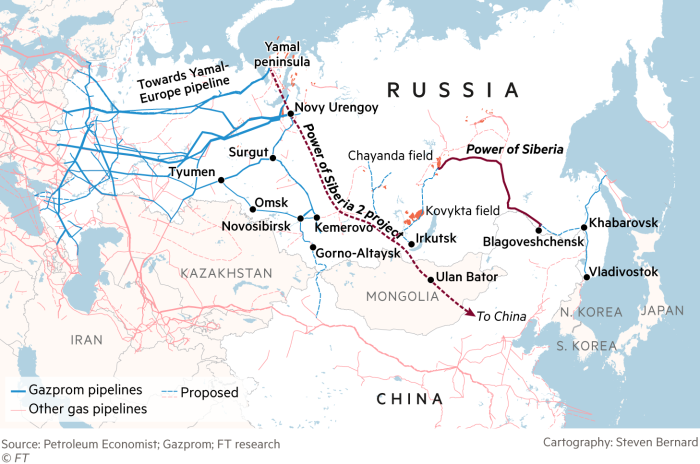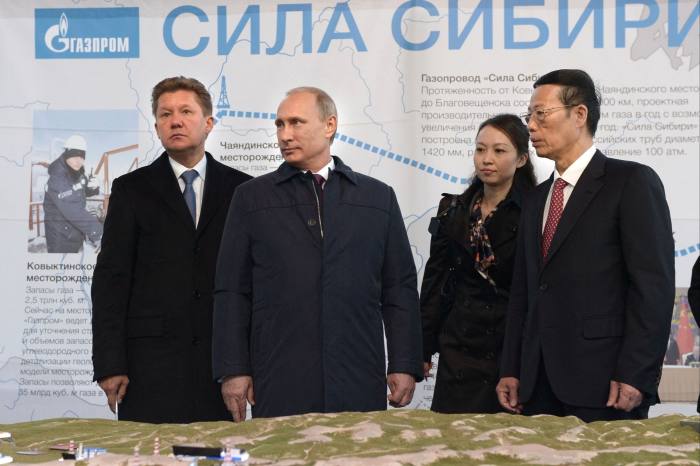[ad_1]
Russia’s prime minister left China this week with no reward Moscow has lengthy prized: a transparent dedication from Beijing on Energy of Siberia 2, a grand fuel pipeline venture to rework power flows throughout Asia.
Conceived greater than a decade in the past to assist Russia “flip to the east”, the pipeline by means of Mongolia to China was a option to diversify fuel gross sales, bolster revenues, and provides the Kremlin extra diplomatic clout.
That venture, first dubbed “Altai” after the mountainous area of southern Siberia, has taken on new urgency because the invasion of Ukraine, with Moscow searching for new retailers for fuel that flowed to Europe earlier than sanctions stood in the way in which.
The hitch for Moscow is that Beijing — an important financial companion because the full-scale invasion of Ukraine — seems in no rush to interact. It’s a reticence that analysts say reveals how weak wartime Moscow’s bargaining energy has turn out to be when coping with its economically extra highly effective neighbour.
One other Russian pipeline, the Energy of Siberia, was launched in 2019 and is anticipated to achieve its most capability of 38 bcm per 12 months by 2024. However this pipeline relied on growing new gasfields in jap Siberia, which had by no means despatched the gasoline to Europe — making it much less helpful to Moscow’s diversification technique.
The PS-2, in distinction, goals to provide China with fuel from the north-eastern Yamal peninsula, which traditionally served the European market by means of a number of pipelines, together with the Nord Stream, whose provides had ceased to circulation in disputes with the EU even earlier than it was sabotaged in 2022.

Searching for options has moved from being a strategic alternative on Russia’s half to its solely choice.
“Beijing has a historical past of prolonging negotiations to get a greater deal — this was the case when the Energy of Siberia 1 was negotiated,” mentioned Alicja Bachulska, a China coverage skilled on the European Council on International Relations. “As Russia’s aggression towards Ukraine has became a protracted warfare, Beijing believes that its bargaining place vis-à-vis Moscow can solely get stronger.”
Taking its time might allow China to safe a lower cost for fuel by means of the pipeline, she added.
Sino-Russian talks over the pipeline had intensified within the months earlier than the warfare. In the course of the Beijing Olympics, Vladimir Putin and Xi Jinping signed a 25-year contract for the far-eastern route and “positively talked concerning the PS-2”, mentioned Tatiana Mitrova, a analysis fellow at Columbia College’s Middle on World Vitality Coverage.
However since then, whereas Russia has repeatedly emphasised its readiness to launch PS-2, Beijing has been conspicuously silent. Whereas visiting the Kremlin in March, Xi skirted round PS-2 — whereas Putin spoke concerning the plan as if it had been a completed deal, saying “virtually all parameters . . . have been finalised”.

Cautious to not rely too closely on anyone provider, China has been energetic in securing pure fuel contracts for bigger portions than it really wants, mentioned Gergely Molnar, the Worldwide Vitality Company fuel analyst.
China depends on Russia for simply over 5 per cent of its fuel provide, he mentioned. Along with deliberate will increase in provide by means of current routes from Russia, settlement on PS-2 would enhance that share to about 20 per cent by the early 2030s.
China does stand to achieve from the pipeline. It’s eager to diversify the nation’s power sources, particularly overland provides from Russia and Central Asia that will be safer than sea routes within the occasion of geopolitical or navy tensions with the west.
“The transportation of fuel is safer to undergo Russia, by means of land transport, in contrast with [the] faraway Center East,” mentioned Lin Boqiang, the top of the China Institute for Research in Vitality Coverage, Xiamen College.

There are geopolitical problems to agreeing the deal towards the backdrop of warfare in Ukraine. However some China coverage consultants consider a deeper power partnership with Russia is barely a matter of time.
“Nobody ought to actually anticipate that China ought to reduce off its entry to Russian oil and fuel,” mentioned Victor Gao, vice-president of the Beijing-based Middle for China and Globalization. “This type of commerce is regular, it’s peaceable commerce.”
He mentioned the massive power commerce between Russia and China would “ultimately result in a reconfiguration of the oil and fuel provide on the earth . . . and the west shouldn’t be stunned by that”.
For Russia, the development of the PS-2 is the one option to compensate for not less than a part of the EU promote it has misplaced. That market accounted for many of the fuel produced from the Yamal peninsula. However this implies there isn’t a explicit incentive for China to conform to the brand new pipeline now.

China, certainly, has been busy growing different overland provides. At a summit with Central Asian international locations final week, Xi championed the development of the so-called Line D pipeline, which might be China’s fourth within the area bringing fuel from Turkmenistan.
About 35 bcm of fuel had been exported to China by way of three pipelines from Turkmenistan final 12 months. That compares with 16 bcm despatched by Russia by way of Energy of Siberia.
Even with the PS-2 pipeline in place, Russia wouldn’t be capable to match what it has misplaced in European gross sales. The value of this fuel would even be decrease. Fuel despatched by means of the primary Energy of Siberia pipeline — on phrases struck when Russia’s negotiating place was a lot stronger — is priced nicely under the European market fee.
Sergei Vakulenko, a former technique director for Gazprom Neft and a senior fellow on the Carnegie Endowment for Worldwide Peace mentioned Russia fails to even match the worth China pays for pipeline imports from different suppliers.
Given these components, PS-2 would generate an estimated $12bn a 12 months for Gazprom, of which the state would obtain about $4.6bn in duties and tax, in line with Ronald Smith, senior oil and fuel analyst at BCS World Markets.
This sum, equal to lower than half of Russia’s common month-to-month power revenues in 2023, would hardly be transformative. However the Kremlin is determined for added income as its funds deficit balloons, its warfare prices enhance, and its European fuel gross sales wane. Mitrova of Columbia College mentioned: “This fuel has nowhere else to go.”
[ad_2]
Source link

